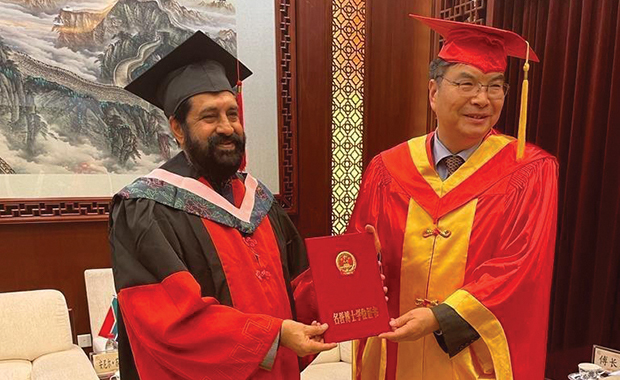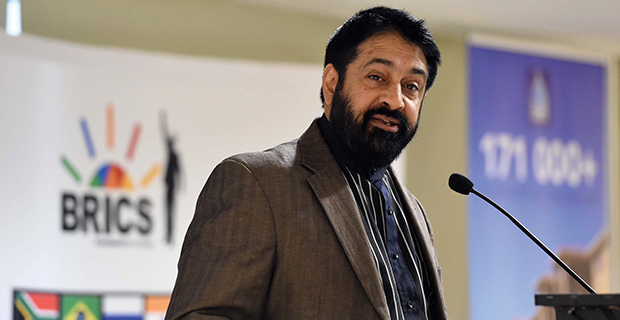“Wish to make ties more visible”
Ambassador Anil Sooklal is the South African High Commissioner designate to India. A descendant of Indian indentured workers from Uttar Pradesh, he is a double PhD, including a doctorate in Hindu Studies, the first South African to receive one. He wishes to expand extensively on commercial ties between the two nations for which the India-South Africa Chamber of Commerce has been established. He firmly believes that the level of bilateral trade and investment should double swiftly. He says that a lot is happening between India and South Africa but mostly people are unaware of it. He wishes to bring in much more visibility into the relationship. He spoke to Bula Devi, Consulting Editor (International Affairs), on a range of subjects before his arrival in India.

Given the historical ties between the two countries, what would be your priorities to strengthen and build our diplomatic and business foundations?
I don’t think there is any country that has such a strong historical bondage. I constantly pose the question, ‘Had Gandhi not come to South Africa, would India’s freedom struggle have turned the way it did?’ It was the African environment that influenced him. He came to South Africa as a barrister, not to play a political leader’s role. But he left here emancipated, he witnessed injustices and racism. His whole philosophy of satyagraha and ahimsa was influenced by what happened to him in South Africa. From that background, he became a leading light in India’s freedom struggle.
We have a strong bondage, not just because of Gandhi but the indentured labourers. The Indians came to South Africa soon after the great Indian mutiny. So, they knew resistance, and they may have been labourers but they were highly cultured. They built their own schools, temples, cultural centres, hospitals, etc. The regime of that time did not cater for education. They survived under very harsh conditions. So, this is what I am going to build on. We shared history on so many fronts. We have a very solid base. I would like to see that deepened and strengthened.
I would like to see our commercial ties expanded extensively. In order to achieve this we launched the India-South Africa Chamber of Commerce. We brought together business houses from South Africa and India under one chamber; this has happened for the first time in 30 years of our relationship. It has become a significant platform to facilitate businesses. We needed such a platform because economic ties should not be at the level it is now. It should be more than double. Our trade currently is about $15 billion but I believe the growth can be exponential. My focus will be to deepen the ties in this area and also, especially in the SMEs sector to allow businesses of small scale industries, women and youth in business on both sides to thrive.
I got to know during the discussions in the past three months that there is a great appetite for economic, trade and investment ties, and technology sharing, as well as addressing joint development programmes. I think there is a great deal of synergy amongst the youth and women. We are both vibrant democracies. Our mindset is the same. We come from an open society background. Democracy is ingrained in our upbringing. These are the synergies that make us natural partners. Strengthening India-Africa relation is a critical part of what I would like to do. India played a big role in making Africa part of the G20 when we got the Presidency.
I would also like to see greater visibility of this relationship. We have such a strong historical level relationship, culturally and otherwise, but it lacks visibility. I would like to focus on greater visibility of this vibrant relationship, especially now that we are in our 30th year of diplomatic relationship. So, there will be three priority areas, firstly strengthening trade, secondly visibility of the relationship between the two countries, and thirdly people-to-people contact.
South Africa and India cooperate on many bilateral and multilateral fronts and you have been part of some of those. What are your thoughts on these various engagements that take place simultaneously?
On the bilateral front, my focus will be to strengthen all relations on all fronts. But on the multilateral front also, India and South Africa are natural partners because we are vibrant democracies and that is why in 2003 we got together with Brazil, the three vibrant democracies, and created IBSA (India-Brazil-South Africa). IBSA has been an important entity in championing democracy, fundamental rights, human rights and strengthening the United Nations system. These are the countries asking for reforms of the United Nations. The UN has an outdated, archaic structure. India and South Africa should be in a reformed United Nations Security Council with equal rights as that of the P5 members. The P5 members are no longer the largest economy; India is the fifth largest global economy yet not sitting in the P5. India and South Africa have no voice in the security council. Africa has 54 sovereign states. How can anyone call it a legitimate United Nation system?
On the multilateral front, India and South Africa have been working together and we need to strengthen it and continue the call for reform of the United Nations system in its totality including its security council, reform of the financial institutions which are not representative of the global community; the current form of the WTO and all other multilateral organisations such as the World Health Organisation need reforms because the world has changed dramatically in the past decades. It’s not a static world but a dynamic one. The most powerful nations of the high table of 1945 have changed. There are new players on the stage now like India, Brazil, South Africa, China. These countries were poor in 1945 but they are more powerful now. So, I would like India and South Africa to work towards reforming the multilateral system, the global government architecture, geo-political architecture, financial architecture to make these more inclusive, more representative, more fair, and more just where no one is truly left behind. The majority of the world makes the Global South now but we are still left on the margins. This is why we created the Brics and India and South Africa are very important members of the configuration. The Global South is now providing leadership in shaping a new geo-political economy and India and South Africa will be leaders in this process.











Comments.